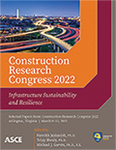Smart Building Conceptualization: A Comparative Analysis of Literature and Standards
Publication: Construction Research Congress 2022
ABSTRACT
Smart building is an emerging concept in the contemporary built environment that aims to leverage new technologies and practices to improve building’s performance. Despite recent efforts to articulate the concept, there is still no commonly accepted definition for the term smart or intelligent building. Also, there are discrepancies in smart buildings’ components and evaluation criteria identified by academic literature and industry publications. This paper analyzes the concept of smart building in order to determine its context and applications. For this purpose, in this paper, we completed a comprehensive literature review of both academic articles and building certification standards to summarize the current interpretations and characteristics of smart buildings. Subsequently, we conducted a comparative ontological analysis on the selected publications and the relevant building certification standards to further identify smart building’s components in comparison with other relevant concepts including sustainable building. The results of this study will benefit future research in smart buildings as well as the development of certification standards for smart buildings’ evaluation.
Get full access to this article
View all available purchase options and get full access to this chapter.
REFERENCES
Alwaer, H., and Clements-Croome, D. J. (2010) Key performance indicators (KPIs) and priority setting in using the multi-attribute approach for assessing sustainable intelligent buildings. Building and Environment, 45(4), 799–807. (https://doi.org/10.1016/j.buildenv.2009.08.019, accessed 08/11/2020).
Chow, L. K. H., and Leung, A. Y. T. (2005) New Intelligent Building Index For Buildings Around The World – A Quantitative Approach In Building Assessment Experience With Hong Kong Tallest Building, Two International Finance Centre, The 2005 World Sustainable Building Conference, Tokyo, 27–29.
De Groote, M., Volt, J., and Bean, F. (2017) Smart Buildings Decoded. The Concept Beyond the Buzzword, the Buildings Performance Institute Europe (BPIE), (https://www.bpie.eu/wp-content/uploads/2017/06/PAPER-Smart-buildings-decoded_05.pdf, accessed 01/05/2021).
Froufe, M. M., Chinelli, C. K., Guedes, A. L. A., Haddad, A. N., Hammad, A. W. A., and Soares, C. A. P. (2020) Smart Buildings: Systems and Drivers. Buildings 10 (9): 153. (https://doi.org/10.3390/buildings10090153, accessed 03/11/2021).
Ghaffarianhoseini, A., Berardi, U., AlWaer, H., Chang, S., Halawa, E., Ghaffarianhoseini, A., and Clements-Croome, D. (2016) What is an intelligent building? Analysis of recent interpretations from an international perspective, Architectural Science Review, 59:5, 338–357, (https://doi.org/10.1080/00038628.2015.1079164, accessed 06/12/2020).
Himanen, M. (2003) The Intelligence of Intelligent Buildings; The Feasibility of the Intelligent Building Concept in Office Buildings. Technical Research Center of Finland. VTT.
Katz, D., and Skopek, J. (2009) The CABA Building Intelligence Quotient Programme. Intelligent Buildings International 1 (4): 277–95. https://doi.org/10.3763/inbi.2009.SI05.
King, J., and Perry, C. (2017) Smart Buildings: Using Smart Technology to Save Energy in Existing Buildings. SMART BUILDINGS, 55. American Council for an Energy-Efficient Economy (ACEEE), Washington DC.
Kroner, W. M. (1997) An intelligent and responsive architecture, Automation in Construction 6, 381–393.
Jain, K. (2019) Development of a Smart Building Evaluation System for Office Buildings. (https://doi.org/10.13140/RG.2.2.32122.24000, accessed 05/12/2021).
Latour, B. (2005) Reassembling the social: An introduction to actor-network-theory. Oxford University Press.
Pitts, J. M., and Jackson, T. O. (2008) Green buildings: Valuation issues and perspectives. Appraisal Journal, 76 (2), 115–118.
Verbeke, S., Aerts, D., Reynders, G., Ma, Y., and Waide, P. (2020) Final Report on the Technical Support to the Development of a Smart Readiness Indicator for Buildings, VITO, European Commission, B-1049 Brussels.
Wong, J. K. W., Li, H., and Wang, S. W. (2005) Intelligent building research: a review., Automation in Construction, 14 (1), 143–159.
Information & Authors
Information
Published In
History
Published online: Mar 7, 2022
Authors
Metrics & Citations
Metrics
Citations
Download citation
If you have the appropriate software installed, you can download article citation data to the citation manager of your choice. Simply select your manager software from the list below and click Download.
